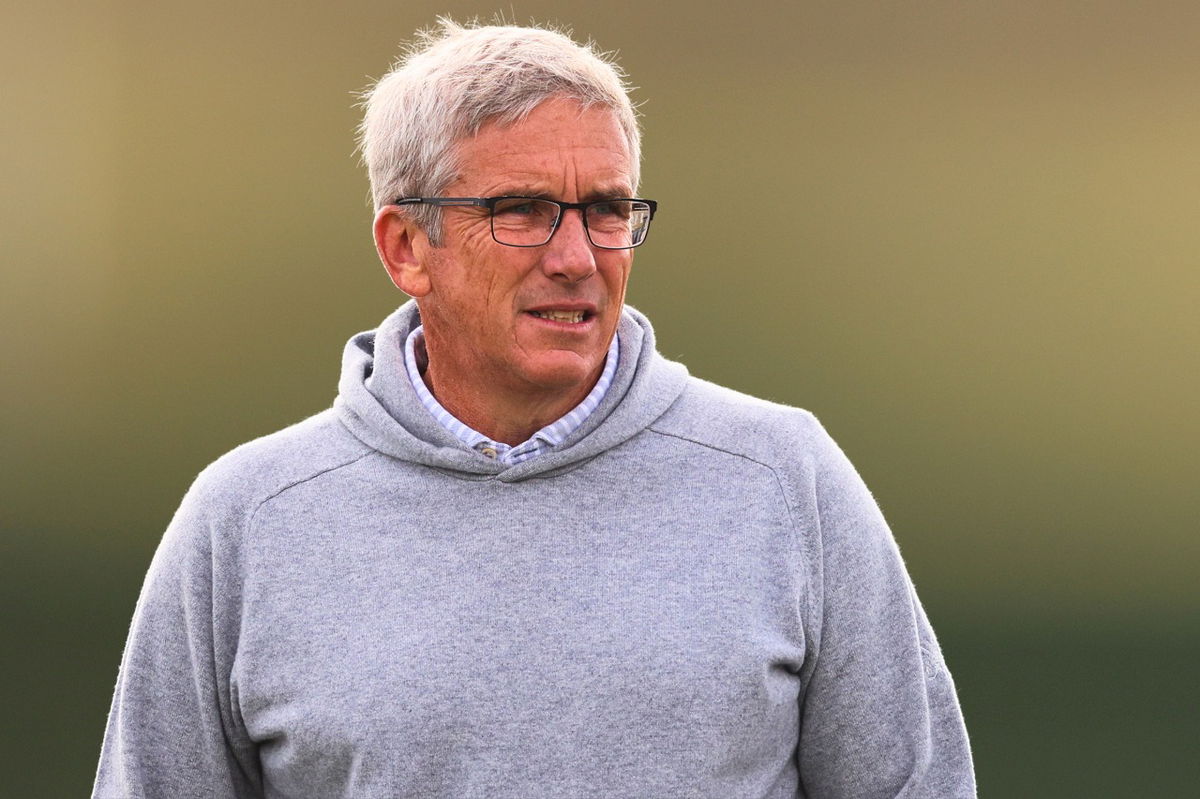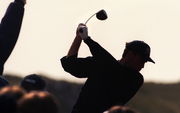
Getty
Source: Getty Images

Getty
Source: Getty Images
Another case of slow play has come to light! And yet again, the leading bodies of golf fail to take the appropriate action to penalize the golfers for it. For years, the PGA Tour has faced issues of pace of play. Exhaustingly slow golfers like Patrick Cantlay and Jordan Spieth have often been criticized for causing unnecessary delays and disrupting the flow of the round. Jay Monahan & Co. have fined those golfers for the same in the past. But the damages are so minimal that it didn’t bother them enough to improve their pace on the course.
Watch What’s Trending Now!
Discussing the same issue on the latest episode of the Golf Podcast with Rex & Lav, Ryan Lavner spoke about another incident that has recently come to light. He started the conversation with “I understand that range finders are another potential tool in a speed of play tool belt, right? Like, if you get offline, it can help. If there’s short yardages, 50 yards to those awkward distances, it can help. But if the impact of using range finders is minimal… Like maybe trimming a minute or two over the course of a full four, four and a half hour round. Is that really worth reducing the potential advantage that a good caddie can give you?”
Jay Monahan & the PGA Tour had proposed allowing the usage of range finders to improve the pace of play earlier this year. Lav wanted to know if the usage of range finders to improve the pace of play was worth reducing the value of great caddies who can read the fairway and greens better. Lav stated that the caddies would argue it wasn’t worth it. Instead, he argued, “If the PGA Tour really wanted to crack down on pace of play, speed of play, it’s going to come down to eliminating the second warning.” The Golf Channel expert believes that the PGA Tour shouldn’t just warn the golfers if they break the pace of play rule.
ADVERTISEMENT
“Once you get on the clock, if you get a bad time, it’s a one-shot penalty. No more warning,” suggested Lav as he advised Jay Monahan & Co. to introduce stricter penalties for breaking the pace of play rule. He shared an example of an incident at the NCAA Championship a few hours ago on Sunday, as the tournament leader, Michael La Sasso, had a bad time and was just warned about it. “If golf wants to be serious, you have to start stroking these guys,” he added, pushing the one-stroke penalty narrative.

Imago
PGA, Golf Herren Zurich Classic of New Orleans – Second Round Apr 21, 2023 Avondale, Louisiana, USA Patrick Cantlay walks the third green during the second round of the Zurich Classic of New Orleans golf tournament. Avondale Louisiana USA, EDITORIAL USE ONLY PUBLICATIONxINxGERxSUIxAUTxONLY Copyright: xAndrewxWeversx 20230421_anw_pl2_011
Speaking about how lenient the PGA has been to its players, Lavner stated, “It is unheard of that the PGA Tour has not doled out a slow play stroke penalty for guys since 1995.” Yes, the last time a pro golfer received a one-stroke penalty was 30 years ago. The last player to get penalized with a stroke addition was Glen Day in the 1995 Honda Classic. The last time a one-stroke penalty was given in a PGA Tour team event was in the 2017 Zurich Classic of New Orleans, where both Brian Campbell and Miguel Angel Carballo recorded bad times. Hence, they weren’t given a warning and penalized immediately.
ADVERTISEMENT
As a concluding statement, Lav stated that a reduction in FedEx Cup points or fines won’t make a difference to the PGA Tour pros who earn millions every year from playing regularly in tournaments. “You have to hit them where it really hurts, and that is on the leaderboard,” he said, strongly recommending modifications in the pace of play issue.
Ryan Lavner summarized the pace of play issue really well and provided a good suggestion. Interestingly, the LPGA Tour has been successfully imposing these rules, and hence, the players have been more cautious of breaking them.
ADVERTISEMENT
Top Stories
LIV Golf Braces for Another Possible Exit in Wake of Brooks Koepka Departure

Rory McIlroy Makes Feelings Clear on Bryson DeChambeau’s PGA Tour Return: ‘Have Lost…’

Amanda Balionis Confirms New Relationship Ending Months of Rumors

Bryson DeChambeau Gives Reality Check to Phil Mickelson When Asked to Select His Mount Rushmore for Golf

After Brooks Koepka, Another Pro Cuts All Ties With LIV Golf & Publicly Backs PGA Tour

Golf Channel analyst’s suggestion proven to work by the LPGA Tour
Unlike the PGA Tour, the LPGA Tour doesn’t have a full-time commissioner since the exit of Mollie Marcoux. Despite that, the players have been commended for having better control over the pace of play in the league. In fact, despite the lack of definite leadership, the management hasn’t shied away from penalizing its players for slow play. That started the conversation about how Jay Monahan should learn from the team managing women’s golf to regulate the pace of play issue.
More recently, during the U.S. Women’s Open Qualifiers, Aline Krauter and 8 others were also penalized for not being able to reach their checkpoints. Krauter was in one of the three groups that couldn’t finish their rounds within the regulation time, thus facing a one-stroke penalty for breaking the rules. Should such strict rules be implemented by Jay Monahan & Co., then the PGA Tour might face fewer slow-play issues and better-paced tournaments.
ADVERTISEMENT
ADVERTISEMENT
ADVERTISEMENT
ADVERTISEMENT

